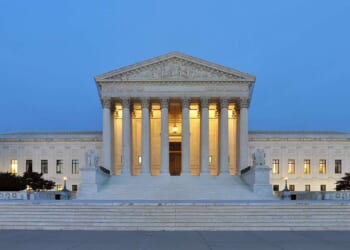“Everything is possible with Donald Trump,” one State Department source familiar with the hiring told The American Conservative.
This person was speaking of the shock retention of Darren Beattie as the acting undersecretary of state for public diplomacy and public affairs. Amid the blitzkrieg—“days of thunder” as the former Trump chief strategist Steve Bannon has put it—of policy shake-ups, outré cabinet selections, and vintage populist bluster that have characterized the new administration in its early months, perhaps no move is more “Trump 2.0” than the elevation of Beattie.
Because after years in the veritable digital wilderness (where his profile only grew, and, some might say, became a legend), Beattie is back in the saddle at Washington.
Ousted from the White House speechwriter’s office in late summer 2018 during Donald Trump’s first stint in power, the original scandal that did Beattie in now seems downright passé—like something that the key Trump backer Elon Musk might post out unedited in 2025, and or Vice President J.D. Vance would engage with on X. Beattie’s (even then openly Googleable) address to the obscure H.L. Mencken Club was excavated by CNN, and he was sacked from the Trump team by establishment apparatchiks that are a far rarer, more cowed breed in Trump’s second tour as president.
In the years since, the scandal (perversely for opposition-minded, liberal journalists) seems to have served only to bolster Beattie’s myth and enhance his profile.
Few figures showcase the flipside of cancellation in American life better than Beattie; few notables better embody the “post-woke” moment America has supposedly now entered. In exile, 2018–25, Beattie founded Revolver News: a no-holds-barred right-wing aggregator that aimed (with no small success) to supplant Drudge Report, which many in the Trump fold see as utterly wayward. Beattie became a “friend of the show” on Bannon’s instrumental War Room podcast, where he cultivated a Strangelovian presence and mystique.
I’ve known Beattie for years. During the previous administration, I would greet him as “my favorite Biden administration official” for his service on the U.S. Commission for the Preservation of America’s Heritage Abroad, which extended into the 46th president’s term. A shotgun appointment in the helter-skelter final days of the first Trump tour, it would take a year before the Democrats either got around or figured out how to fire him.
Behind closed doors, as a government official or as a civilian philosopher, Beattie is careful, diplomatic, even reserved. Bar none, he was the most professional, ideologically-committed interlocutor I dealt with in the early Trump White House, which otherwise could be characterized, with few qualifications, as a shocking clown show of mandarins who had little idea, and little real interest in, why Donald Trump had just been elected president.
But this characterization of Beattie the person—surgical, not garrulous—may shock those only familiar with Beattie the persona. In a way, his story and style are inescapably 2020s: Bolt-from-the-blue exclusives with Imran Khan, the jailed Pakistani cricket star-turned–prime minister–turned-opposition leader, “for the ’gram” are interspersed with cartoon degradations of the Dispatch editor Jonah Goldberg. Both are put to the side when working for the U.S. secretary of state.
When Beattie initially shot to attention, in the 2015–16 era, he was the only non-tenured academic in the country publicly to endorse Trump for president. It was a considerable risk. Beattie had been a math prodigy at UChicago before pivoting to a political theory PhD at Duke, where he later taught. A protege of the Leo Strauss guru Nathan Tarcov, Beattie’s choices meant breaks not only with the well-worn (if precarious) path of American academia, but also with the malfunctioning conservative clerisy that Trump’s rise has so humiliated.
There are other details that are peculiar about Beattie. Originally from Denver, he was actually partially reared in Palau, the Micronesian island even few State Department officials could locate on a map. His father was recruited to be a supreme court justice in that republic. (Elon Musk could only dream that the U.S. judiciary were so anarcho-capitalist.) In private correspondence over the years, one gets the sense from Beattie that upon his return to the States, he barely recognized the country he had left behind. What motivates his politics then is perhaps unsurprising, and perhaps little different than many of the “forgotten men and women” the president says he represents.
But why this job, why this role and why now?
To allies, it’s no real surprise. Beattie is perhaps a better fit here than he ever was at the speechwriter’s office, a den of influential but often thankless work. In comments on the circuit in 2016, Beattie made clear that his shock support for Trump was based on two reasons: the future president’s revolution in Republican foreign policy, and the then-candidate’s adamance on the immigration issue.
Most of all to some of his now-colleagues, Beattie vaulted to prominence by insisting that sponsoring “color revolutions” in foreign countries is a staple of contemporary U.S. statecraft and heavily insinuating the January 6, 2021 riot at the Capitol was an inside job. The latter claim’s prominence peaked with a 60 Minutes interview with Senator Ted Cruz asking publicly, “Who is Ray Epps?”
Nor on the third leg of the traditional Trumpian stool, reforming “free” trade, has Beattie been bashful.
Writing in National Review in 2017, Beattie argued,
[BLOCK]From the immediate abandonment of the Trans-Pacific Partnership (TPP), to the recent ‘hire American buy American’ executive order, to the strong likelihood of serious and important steps to renegotiate NAFTA, there is much in President Trump’s actions thus far in his term to encourage his economic-nationalist base.[/BLOCK]
He continued,
[BLOCK]Conservatives and libertarians who remain shackled to a Cold War economic ideology ought to take note that Milton Friedman himself stated that his chief purpose was not to advocate for one specific economic agenda over another but rather to protect individual liberties and free enterprise from the threats of concentrated power.[/BLOCK]
“Protecting individual liberties” appears to have become Beattie’s self-justification in recent years.
To friends, Beattie has praised (with some apparent surprise) the leadership of his boss, Marco Rubio. The secretary has deployed Beattie as the tip of the spear on what is increasingly being termed “free speech diplomacy” by not only the Seventh Floor at Foggy Bottom, but also the vice president’s office. (See Vance’s “shock and awe” address at the 2025 Munich Security Conference denouncing European speech and democratic controls.)
Rubio’s own commitment to free speech appears robust enough that he hasn’t sacked Beattie for past baiting comments about the now-secretary. (Beattie’s allies would insist he was in “shock jock” mode, but critics might complain that it’s convenient that he gets to pick and choose).
This is no sideshow work. Beattie appears to be in the thick of it. In late March, Trump’s government made clear that there would be no free trade agreement with the lumbering post-Brexit British state if London didn’t comply with free speech standards. An article in the Telegraph to this effect roiled Westminster, despite Prime Minister Keir Starmer’s surprisingly convivial relationship with Trump.
The vulnerability here, of course, is that the administration is cracking down in parallel on criticism of Israel’s forever war in Gaza and the broader Middle East. The risk for free speech warriors in this administration is the appearance of hypocrisy, and building a two-tiered moral system. Beattie, the political philosopher, is said to see it pragmatically: You don’t throw out the good with the bad, and such decisions are above his pay grade.
Which raises the question: Is he playing the long game, and in DC to stay?
Subscribe Today
Get daily emails in your inbox
Beattie decamped to South Florida, the world headquarters of Republican exile, in the Biden years. Is this second tour a victory lap or the start of something bigger? Not yet 40, the president is twice his age. Might Beattie ride the rails of government for years and administrations to come? It’s suddenly a startling plausibility.
The administration is unlikely to subject him to any Senate confirmation battle (although seeing Beattie joust with certain members of the upper chamber would be must-watch). If the Trump personnel carousel starts revving up again, anyone who survives could profit. Indeed, if Trump eventually dispenses with National Security Advisor Michael Waltz, State Department Policy Planning Director Michael Anton is seen as a ringer for the role. Could Beattie replace Anton?
Whatever the contingencies, Beattie’s bet on Donald Trump might only now be maturing.







